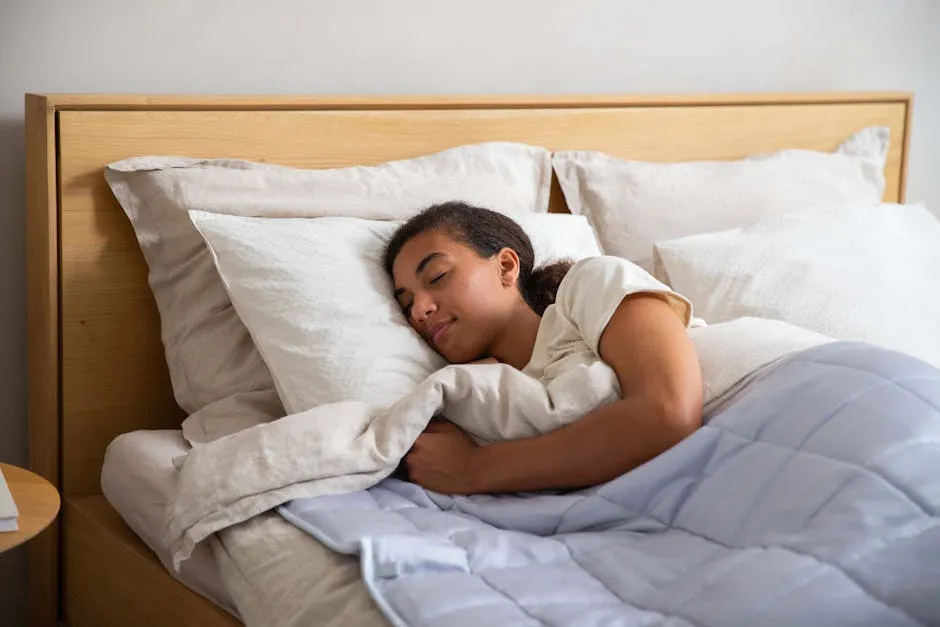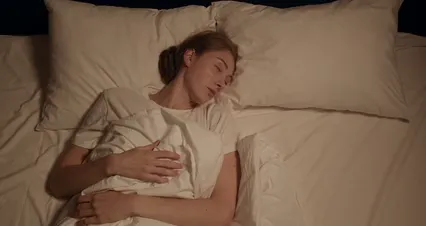
Why Do Environmental Factors Influence Sleep Disorders Like Bruxism?
Heavy metals like lead and mercury can have damaging effects on neurological function, potentially leading to sleep disturbances. These toxins not only affect physical health but also interact with psychological stressors, creating a perfect storm for bruxism. Understanding the impact of why seeking professional help is crucial for managing bruxism is essential for those affected.
Understanding the need for professional help can significantly aid in managing bruxism effectively. why is seeking professional help crucial for managing bruxism in the coming months

Environmental Factors and Sleep Disorders
Heavy Metals and Sleep
Heavy metals like lead and mercury aren’t just bad for your health; they also mess with your sleep. These toxic elements can disrupt neurological function, leading to a variety of sleep disturbances. According to a review published in Environmental Research, exposure to heavy metals has been positively linked to poor sleep quality and increased sleep disorders, including bruxism.
Studies indicate that children exposed to higher levels of lead reported significant sleep issues, such as insomnia and excessive daytime sleepiness. One study found that kids with elevated blood lead levels experienced prolonged sleep onset. It’s as if their bodies were in a constant state of alertness, making restful sleep a rare luxury.
The mechanisms behind this are twofold: neurotoxicity and systemic inflammation. Heavy metals can induce neurodegeneration by generating reactive oxygen species. This neurotoxicity can disrupt neuronal signaling, leading to issues like anxiety and mood disorders, which often accompany sleep problems. Additionally, heavy metals may trigger systemic inflammation. Elevated mercury levels, for instance, have been associated with shorter sleep duration, possibly due to inflammatory markers ramping up.
Bruxism, the nocturnal grinding of teeth, can be one of the casualties of this toxic exposure. The stress on the nervous system caused by heavy metals might lead to muscle hyperactivity during sleep, resulting in those unfortunate grinding sounds. So, if you’ve been grinding your teeth lately, consider taking a look around—your environment might be to blame.

Noise Pollution
If you thought your neighbor’s late-night karaoke sessions were just annoying, think again! Noise pollution poses a serious threat to sleep quality and can contribute to sleep disorders, including bruxism. Research has shown a clear correlation between chronic noise exposure and increased instances of teeth grinding during sleep.
Studies reveal that individuals living in noisy environments report more sleep disturbances. For instance, exposure to road traffic noise has been linked to significant sleep issues, including daytime sleepiness and snoring. Talk about a recipe for disaster! When noise levels rise, our sympathetic nervous system kicks into high gear, activating stress responses that disrupt our peaceful slumber.
To help create a more peaceful environment, consider investing in Earplugs. They are a simple yet effective solution to block out unwanted noise and can help you sleep like a baby.

The impact of noise on sleep health is not merely anecdotal. In one study, hospital noise was shown to increase incidents of pediatric delirium, underscoring the need for quieter environments. Additionally, noise acts as an acute stressor, causing physiological stress responses that can lead to bruxism. It’s like your body is trying to fight back against the chaos, but instead, it ends up grinding its teeth in frustration.
Light Pollution
In our tech-savvy world, light pollution is a silent sleep thief. Urban lighting and screen time disrupt our natural circadian rhythms. Ever found yourself scrolling through your phone at midnight? You’re not alone! Research shows that exposure to artificial light at night can significantly impair sleep quality.
A study published in Environmental Research highlights that artificial light exposure can lead to shallow sleep and reduced REM activity. REM sleep is crucial for cognitive functions and emotional well-being. When your sleep is fragmented due to light pollution, it can leave you feeling groggy and irritable, much like a bear woken from hibernation!

If you’re struggling with light pollution, consider using Blue Light Blocking Glasses. They can help reduce the impact of screen time on your sleep quality, allowing you to enjoy your favorite shows without the late-night consequences.
This disruption isn’t just frustrating; it can also contribute to bruxism. Poor sleep quality often results in increased muscle tension and grinding of teeth. So, when you’re tossing and turning due to that pesky glow from your devices, your jaw might be working overtime, grinding away as if auditioning for a role in a dental horror film.
Additionally, studies indicate that people exposed to higher levels of artificial light report more sleep-related issues, including bruxism. It’s as if our bodies are trying to communicate: “Hey, turn off that bright screen and let me catch some Z’s!” To combat this, try dimming the lights in your home as bedtime approaches. Creating a dark environment signals to your brain that it’s time to wind down.
So, next time you find yourself binge-watching your favorite series late into the night, remember: that bright screen could be the reason you’re grinding your teeth. Let’s turn down the lights and give our sleep the quality it deserves!

Psychological Stress and Its Interaction with Environmental Factors
The Role of Stressors
Psychological stress is like a persistent alarm clock that never shuts off. It can wreak havoc on our sleep, especially when combined with environmental stressors. Think about it: you’ve had a long day at work, and the traffic noise outside your window doesn’t help. This combination of stressors can lead to bruxism, where your jaw becomes a grinding machine while you’re blissfully unaware.
Anxiety and stress are closely linked to increased muscle activity during sleep. When your mind is racing with thoughts about work deadlines or family responsibilities, your muscles can become tense. This tension doesn’t just disappear when you close your eyes. Instead, it manifests as teeth grinding. Research shows that people with higher levels of anxiety are more likely to experience bruxism. Understanding why coping strategies are essential for handling anxiety can be beneficial in managing these symptoms.
Coping strategies play a vital role in managing anxiety and can help reduce bruxism occurrences. why are coping strategies essential for handling anxiety in daily life
In a world that often feels chaotic, it’s essential to recognize how environmental factors can amplify our psychological stress. For example, a noisy neighborhood or bright streetlights can create a perfect storm for restless nights and teeth grinding.
Moreover, the COVID-19 pandemic has intensified these issues. Changes in daily routines, increased screen time, and heightened stress have led to a rise in sleep disorders, including bruxism. Many people turned to their screens for comfort, which only exacerbated their sleep issues.

To help manage stress, you might want to try some Melatonin Supplements. They can help regulate your sleep cycle and make drifting off to sleep a little easier.
So, what can you do? Managing stress is crucial for reducing bruxism. Techniques like mindfulness, meditation, and regular exercise can help calm the mind and relax the body. Creating a peaceful sleep environment, free from distractions, is essential for getting the rest you need.
Remember, a good night’s sleep starts with a calm mind and a comfortable environment. Addressing both psychological and environmental stressors can help you stop grinding your teeth and embrace restful nights.

Interplay of Environmental and Psychological Factors
Environmental factors and psychological issues often dance together, creating a chaotic rhythm that can heighten sleep disorders like bruxism. Imagine this: you’re trying to catch some Z’s, but your neighbor has decided that 2 AM is the perfect time for a drum solo. The external noise not only disrupts your sleep but can exacerbate any underlying anxiety you might be feeling.
Take the COVID-19 pandemic as a prime example. The lockdowns altered daily routines and introduced new stressors. Suddenly, folks were juggling remote work, homeschooling, and the anxiety of a global crisis—all while trying to sleep in a noisy, uncertain environment. Studies indicate that these lifestyle changes significantly impacted sleep quality and increased the prevalence of bruxism.
Additionally, increased screen time during the pandemic has been a double-edged sword. While binge-watching became a coping mechanism, the blue light from screens messes with our circadian rhythms and ramps up stress levels. This combination can trigger or worsen bruxism, as the stress manifests in our jaws during sleep.
In summary, environmental factors like noise and light pollution can amplify existing psychological strains, leading to a higher incidence of bruxism. It’s a vicious cycle where our surroundings contribute to our mental stress, which in turn affects our sleep quality. Recognizing this interplay is essential for understanding how to tackle sleep disorders more effectively.

Implications for Public Health
Understanding the relationship between environmental factors and sleep disorders like bruxism carries significant implications for public health. The prevalence of bruxism is not just a dental concern; it affects overall health. The American Academy of Sleep Medicine estimates that around 13% of adults experience sleep bruxism, a number that could be reduced with targeted interventions.
One potential approach involves developing public policies aimed at mitigating environmental impacts that disrupt sleep. For instance, cities could implement noise regulations to limit nighttime disturbances, or encourage urban planning that prioritizes quiet zones. Such measures could significantly improve sleep quality for residents, potentially reducing the incidence of bruxism and associated health issues.

Moreover, understanding the multifaceted relationship between environmental factors and sleep disorders can guide research priorities. For example, studies should focus on the biological mechanisms that link heavy metal exposure, noise pollution, and light pollution to sleep disturbances. This research can inform prevention strategies, leading to more effective treatments for bruxism.
Additionally, public health campaigns could raise awareness about the impact of lifestyle choices on sleep health. Simple changes, like reducing screen time before bed or creating a calming bedtime routine, can help individuals mitigate their risk of bruxism.
Speaking of calming routines, consider incorporating an Essential Oil Diffuser into your nighttime routine. The soothing scents can create a serene atmosphere, perfect for winding down and preparing for sleep.
In conclusion, addressing the environmental factors that contribute to sleep disorders is crucial. By developing informed public policies and encouraging further research, we can create healthier sleep environments. This, in turn, will lead to better outcomes for individuals affected by bruxism and other sleep-related disorders. Investing in our sleep health is an investment in our overall well-being.

Conclusion
Understanding how environmental factors influence sleep disorders like bruxism is crucial. Bruxism, characterized by teeth grinding during sleep, affects many individuals. As we explored, various environmental elements contribute significantly to this condition.
Noise pollution is a prime culprit, disrupting our sleep cycles and triggering muscle tension. When your neighbor’s late-night antics keep you awake, your jaw may start working overtime. Similarly, light pollution from screens and urban lighting can throw off our circadian rhythms, leading to poor sleep quality and increased grinding.
Heavy metals, lurking in our surroundings, add another layer of complexity. Exposure to these toxins can negatively impact neurological function, resulting in sleep disturbances. It’s alarming to think how these elements intertwine to create a perfect storm for bruxism.
If you’re looking for ways to improve your sleep hygiene, consider reading a Sleep Hygiene Guide Book. It can provide you with valuable tips and insights to enhance your nightly routine.
Recognizing these environmental contributors is essential for promoting better sleep health. We encourage readers to evaluate their surroundings—consider factors like noise, light, and even potential toxins. Small changes can lead to more restful nights and reduce the chances of bruxism.
As we wrap up, let’s call for further research and awareness about these environmental issues. By shining a light on this connection, we can empower individuals to take charge of their sleep health. After all, a good night’s sleep shouldn’t be a luxury; it should be a given!

FAQs
What is bruxism?
Bruxism refers to the involuntary grinding or clenching of teeth, usually during sleep. Symptoms include jaw pain, headaches, and visible wear on teeth. It can lead to dental issues if not managed properly.
How are environmental factors linked to sleep disorders?
Environmental factors such as noise pollution, light exposure, and heavy metals can disrupt sleep patterns. Noise can trigger stress responses, while light interferes with circadian rhythms. Heavy metals can negatively impact neurological health, contributing to sleep disturbances.
What can I do to reduce bruxism related to environmental factors?
To mitigate these impacts, consider using earplugs or white noise machines to combat noise pollution. Reduce screen time before bed to decrease light exposure, and create a calming bedtime routine. Additionally, ensure your living space is free from heavy metals by using water filters and minimizing exposure to industrial areas.
Is bruxism common among children?
Yes, bruxism is notably common in children, with prevalence estimates ranging from 6% to nearly 50%. Factors such as stress, anxiety, and lifestyle changes can contribute to its occurrence. Parents should monitor their children for signs of teeth grinding.
When should I see a doctor for bruxism?
If you experience persistent jaw pain, headaches, or noticeable wear on your teeth, it’s time to consult a healthcare professional. A dentist can provide guidance on treatment options and assess for any underlying issues related to bruxism.
Please let us know what you think about our content by leaving a comment down below!
Thank you for reading till here 🙂
All images from Pexels
Introduction
Let’s face it: grinding teeth while you sleep is about as popular as a surprise fire drill during a movie. Bruxism, the technical term for this not-so-charming habit, is surprisingly common. If you’ve ever been jolted awake by the sound of your own teeth clashing, rest assured—you’re not alone. Many people experience this nocturnal nuisance, often without even realizing it.
But why does this happen? Well, one key player in the bruxism game is our environment. Yes, factors like noise, light, and even pesky heavy metals can nudge us into grinding our teeth as if we’re auditioning for a role in a horror film. As we become more aware of the importance of sleep health, it’s crucial to understand the various influences that can contribute to sleep disorders, bruxism included.
To tackle these environmental nuisances, consider investing in a Sleep Mask. It’s like a cozy hug for your eyes, blocking out intrusive light and helping you drift off into dreamland without distractions.
From your neighbor’s late-night karaoke sessions to the glow of your smartphone at bedtime, our surroundings can wreak havoc on our sleep quality. So, grab your favorite pillow and let’s unpack how environmental factors can lead to teeth grinding and other sleep disorders. Spoiler alert: it’s not just about the stress of daily life; it’s a multifaceted issue that deserves our attention.

Summary
Bruxism, characterized by the involuntary grinding or clenching of teeth during sleep, affects a significant portion of the population. Studies suggest that bruxism is more prevalent in children, with estimates ranging from 6% to nearly 50%, and about 8% in middle-aged adults. Various environmental factors contribute to sleep disorders, including noise pollution, exposure to artificial light, and even heavy metals.
Noise pollution can disturb our sleep cycles, leading to increased bruxism episodes. Research shows that chronic exposure to loud sounds can activate the sympathetic nervous system, causing muscle tension and the urge to grind teeth. Similarly, light exposure, especially from screens, disrupts our circadian rhythms, resulting in poor sleep quality and increased grinding during the night.

To combat the noise, consider a White Noise Machine. It creates a soothing backdrop of sound that can drown out those late-night karaoke sessions and help you fall asleep faster.
Heavy metals like lead and mercury can have damaging effects on neurological function, potentially leading to sleep disturbances. These toxins not only affect physical health but also interact with psychological stressors, creating a perfect storm for bruxism. Understanding the impact of why seeking professional help is crucial for managing bruxism is essential for those affected.
Understanding the need for professional help can significantly aid in managing bruxism effectively. why is seeking professional help crucial for managing bruxism in the coming months

Environmental Factors and Sleep Disorders
Heavy Metals and Sleep
Heavy metals like lead and mercury aren’t just bad for your health; they also mess with your sleep. These toxic elements can disrupt neurological function, leading to a variety of sleep disturbances. According to a review published in Environmental Research, exposure to heavy metals has been positively linked to poor sleep quality and increased sleep disorders, including bruxism.
Studies indicate that children exposed to higher levels of lead reported significant sleep issues, such as insomnia and excessive daytime sleepiness. One study found that kids with elevated blood lead levels experienced prolonged sleep onset. It’s as if their bodies were in a constant state of alertness, making restful sleep a rare luxury.
The mechanisms behind this are twofold: neurotoxicity and systemic inflammation. Heavy metals can induce neurodegeneration by generating reactive oxygen species. This neurotoxicity can disrupt neuronal signaling, leading to issues like anxiety and mood disorders, which often accompany sleep problems. Additionally, heavy metals may trigger systemic inflammation. Elevated mercury levels, for instance, have been associated with shorter sleep duration, possibly due to inflammatory markers ramping up.
Bruxism, the nocturnal grinding of teeth, can be one of the casualties of this toxic exposure. The stress on the nervous system caused by heavy metals might lead to muscle hyperactivity during sleep, resulting in those unfortunate grinding sounds. So, if you’ve been grinding your teeth lately, consider taking a look around—your environment might be to blame.

Noise Pollution
If you thought your neighbor’s late-night karaoke sessions were just annoying, think again! Noise pollution poses a serious threat to sleep quality and can contribute to sleep disorders, including bruxism. Research has shown a clear correlation between chronic noise exposure and increased instances of teeth grinding during sleep.
Studies reveal that individuals living in noisy environments report more sleep disturbances. For instance, exposure to road traffic noise has been linked to significant sleep issues, including daytime sleepiness and snoring. Talk about a recipe for disaster! When noise levels rise, our sympathetic nervous system kicks into high gear, activating stress responses that disrupt our peaceful slumber.
To help create a more peaceful environment, consider investing in Earplugs. They are a simple yet effective solution to block out unwanted noise and can help you sleep like a baby.

The impact of noise on sleep health is not merely anecdotal. In one study, hospital noise was shown to increase incidents of pediatric delirium, underscoring the need for quieter environments. Additionally, noise acts as an acute stressor, causing physiological stress responses that can lead to bruxism. It’s like your body is trying to fight back against the chaos, but instead, it ends up grinding its teeth in frustration.
Light Pollution
In our tech-savvy world, light pollution is a silent sleep thief. Urban lighting and screen time disrupt our natural circadian rhythms. Ever found yourself scrolling through your phone at midnight? You’re not alone! Research shows that exposure to artificial light at night can significantly impair sleep quality.
A study published in Environmental Research highlights that artificial light exposure can lead to shallow sleep and reduced REM activity. REM sleep is crucial for cognitive functions and emotional well-being. When your sleep is fragmented due to light pollution, it can leave you feeling groggy and irritable, much like a bear woken from hibernation!

If you’re struggling with light pollution, consider using Blue Light Blocking Glasses. They can help reduce the impact of screen time on your sleep quality, allowing you to enjoy your favorite shows without the late-night consequences.
This disruption isn’t just frustrating; it can also contribute to bruxism. Poor sleep quality often results in increased muscle tension and grinding of teeth. So, when you’re tossing and turning due to that pesky glow from your devices, your jaw might be working overtime, grinding away as if auditioning for a role in a dental horror film.
Additionally, studies indicate that people exposed to higher levels of artificial light report more sleep-related issues, including bruxism. It’s as if our bodies are trying to communicate: “Hey, turn off that bright screen and let me catch some Z’s!” To combat this, try dimming the lights in your home as bedtime approaches. Creating a dark environment signals to your brain that it’s time to wind down.
So, next time you find yourself binge-watching your favorite series late into the night, remember: that bright screen could be the reason you’re grinding your teeth. Let’s turn down the lights and give our sleep the quality it deserves!

Psychological Stress and Its Interaction with Environmental Factors
The Role of Stressors
Psychological stress is like a persistent alarm clock that never shuts off. It can wreak havoc on our sleep, especially when combined with environmental stressors. Think about it: you’ve had a long day at work, and the traffic noise outside your window doesn’t help. This combination of stressors can lead to bruxism, where your jaw becomes a grinding machine while you’re blissfully unaware.
Anxiety and stress are closely linked to increased muscle activity during sleep. When your mind is racing with thoughts about work deadlines or family responsibilities, your muscles can become tense. This tension doesn’t just disappear when you close your eyes. Instead, it manifests as teeth grinding. Research shows that people with higher levels of anxiety are more likely to experience bruxism. Understanding why coping strategies are essential for handling anxiety can be beneficial in managing these symptoms.
Coping strategies play a vital role in managing anxiety and can help reduce bruxism occurrences. why are coping strategies essential for handling anxiety in daily life
In a world that often feels chaotic, it’s essential to recognize how environmental factors can amplify our psychological stress. For example, a noisy neighborhood or bright streetlights can create a perfect storm for restless nights and teeth grinding.
Moreover, the COVID-19 pandemic has intensified these issues. Changes in daily routines, increased screen time, and heightened stress have led to a rise in sleep disorders, including bruxism. Many people turned to their screens for comfort, which only exacerbated their sleep issues.

To help manage stress, you might want to try some Melatonin Supplements. They can help regulate your sleep cycle and make drifting off to sleep a little easier.
So, what can you do? Managing stress is crucial for reducing bruxism. Techniques like mindfulness, meditation, and regular exercise can help calm the mind and relax the body. Creating a peaceful sleep environment, free from distractions, is essential for getting the rest you need.
Remember, a good night’s sleep starts with a calm mind and a comfortable environment. Addressing both psychological and environmental stressors can help you stop grinding your teeth and embrace restful nights.

Interplay of Environmental and Psychological Factors
Environmental factors and psychological issues often dance together, creating a chaotic rhythm that can heighten sleep disorders like bruxism. Imagine this: you’re trying to catch some Z’s, but your neighbor has decided that 2 AM is the perfect time for a drum solo. The external noise not only disrupts your sleep but can exacerbate any underlying anxiety you might be feeling.
Take the COVID-19 pandemic as a prime example. The lockdowns altered daily routines and introduced new stressors. Suddenly, folks were juggling remote work, homeschooling, and the anxiety of a global crisis—all while trying to sleep in a noisy, uncertain environment. Studies indicate that these lifestyle changes significantly impacted sleep quality and increased the prevalence of bruxism.
Additionally, increased screen time during the pandemic has been a double-edged sword. While binge-watching became a coping mechanism, the blue light from screens messes with our circadian rhythms and ramps up stress levels. This combination can trigger or worsen bruxism, as the stress manifests in our jaws during sleep.
In summary, environmental factors like noise and light pollution can amplify existing psychological strains, leading to a higher incidence of bruxism. It’s a vicious cycle where our surroundings contribute to our mental stress, which in turn affects our sleep quality. Recognizing this interplay is essential for understanding how to tackle sleep disorders more effectively.

Implications for Public Health
Understanding the relationship between environmental factors and sleep disorders like bruxism carries significant implications for public health. The prevalence of bruxism is not just a dental concern; it affects overall health. The American Academy of Sleep Medicine estimates that around 13% of adults experience sleep bruxism, a number that could be reduced with targeted interventions.
One potential approach involves developing public policies aimed at mitigating environmental impacts that disrupt sleep. For instance, cities could implement noise regulations to limit nighttime disturbances, or encourage urban planning that prioritizes quiet zones. Such measures could significantly improve sleep quality for residents, potentially reducing the incidence of bruxism and associated health issues.

Moreover, understanding the multifaceted relationship between environmental factors and sleep disorders can guide research priorities. For example, studies should focus on the biological mechanisms that link heavy metal exposure, noise pollution, and light pollution to sleep disturbances. This research can inform prevention strategies, leading to more effective treatments for bruxism.
Additionally, public health campaigns could raise awareness about the impact of lifestyle choices on sleep health. Simple changes, like reducing screen time before bed or creating a calming bedtime routine, can help individuals mitigate their risk of bruxism.
Speaking of calming routines, consider incorporating an Essential Oil Diffuser into your nighttime routine. The soothing scents can create a serene atmosphere, perfect for winding down and preparing for sleep.
In conclusion, addressing the environmental factors that contribute to sleep disorders is crucial. By developing informed public policies and encouraging further research, we can create healthier sleep environments. This, in turn, will lead to better outcomes for individuals affected by bruxism and other sleep-related disorders. Investing in our sleep health is an investment in our overall well-being.

Conclusion
Understanding how environmental factors influence sleep disorders like bruxism is crucial. Bruxism, characterized by teeth grinding during sleep, affects many individuals. As we explored, various environmental elements contribute significantly to this condition.
Noise pollution is a prime culprit, disrupting our sleep cycles and triggering muscle tension. When your neighbor’s late-night antics keep you awake, your jaw may start working overtime. Similarly, light pollution from screens and urban lighting can throw off our circadian rhythms, leading to poor sleep quality and increased grinding.
Heavy metals, lurking in our surroundings, add another layer of complexity. Exposure to these toxins can negatively impact neurological function, resulting in sleep disturbances. It’s alarming to think how these elements intertwine to create a perfect storm for bruxism.
If you’re looking for ways to improve your sleep hygiene, consider reading a Sleep Hygiene Guide Book. It can provide you with valuable tips and insights to enhance your nightly routine.
Recognizing these environmental contributors is essential for promoting better sleep health. We encourage readers to evaluate their surroundings—consider factors like noise, light, and even potential toxins. Small changes can lead to more restful nights and reduce the chances of bruxism.
As we wrap up, let’s call for further research and awareness about these environmental issues. By shining a light on this connection, we can empower individuals to take charge of their sleep health. After all, a good night’s sleep shouldn’t be a luxury; it should be a given!

FAQs
Please let us know what you think about our content by leaving a comment down below!
Thank you for reading till here 🙂
All images from Pexels




